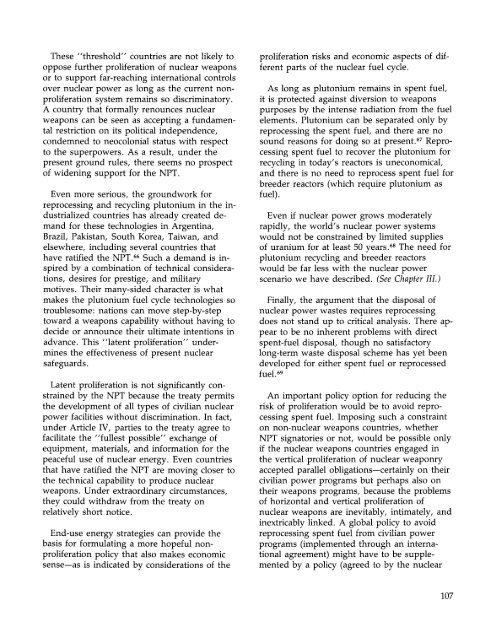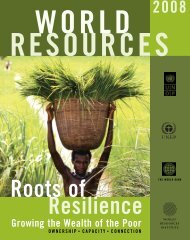ENERGY FOR A SUSTAINABLE WORLD - World Resources Institute
ENERGY FOR A SUSTAINABLE WORLD - World Resources Institute
ENERGY FOR A SUSTAINABLE WORLD - World Resources Institute
You also want an ePaper? Increase the reach of your titles
YUMPU automatically turns print PDFs into web optimized ePapers that Google loves.
These "threshold" countries are not likely to<br />
oppose further proliferation of nuclear weapons<br />
or to support far-reaching international controls<br />
over nuclear power as long as the current nonproliferation<br />
system remains so discriminatory.<br />
A country that formally renounces nuclear<br />
weapons can be seen as accepting a fundamental<br />
restriction on its political independence,<br />
condemned to neocolonial status with respect<br />
to the superpowers. As a result, under the<br />
present ground rules, there seems no prospect<br />
of widening support for the NPT.<br />
Even more serious, the groundwork for<br />
reprocessing and recycling plutonium in the industrialized<br />
countries has already created demand<br />
for these technologies in Argentina,<br />
Brazil, Pakistan, South Korea, Taiwan, and<br />
elsewhere, including several countries that<br />
have ratified the NPT. 66 Such a demand is inspired<br />
by a combination of technical considerations,<br />
desires for prestige, and military<br />
motives. Their many-sided character is what<br />
makes the plutonium fuel cycle technologies so<br />
troublesome: nations can move step-by-step<br />
toward a weapons capability without having to<br />
decide or announce their ultimate intentions in<br />
advance. This "latent proliferation" undermines<br />
the effectiveness of present nuclear<br />
safeguards.<br />
Latent proliferation is not significantly constrained<br />
by the NPT because the treaty permits<br />
the development of all types of civilian nuclear<br />
power facilities without discrimination. In fact,<br />
under Article IV, parties to the treaty agree to<br />
facilitate the "fullest possible" exchange of<br />
equipment, materials, and information for the<br />
peaceful use of nuclear energy. Even countries<br />
that have ratified the NPT are moving closer to<br />
the technical capability to produce nuclear<br />
weapons. Under extraordinary circumstances,<br />
they could withdraw from the treaty on<br />
relatively short notice.<br />
End-use energy strategies can provide the<br />
basis for formulating a more hopeful nonproliferation<br />
policy that also makes economic<br />
sense—as is indicated by considerations of the<br />
proliferation risks and economic aspects of different<br />
parts of the nuclear fuel cycle.<br />
As long as plutonium remains in spent fuel,<br />
it is protected against diversion to weapons<br />
purposes by the intense radiation from the fuel<br />
elements. Plutonium can be separated only by<br />
reprocessing the spent fuel, and there are no<br />
sound reasons for doing so at present. 67 Reprocessing<br />
spent fuel to recover the plutonium for<br />
recycling in today's reactors is uneconomical,<br />
and there is no need to reprocess spent fuel for<br />
breeder reactors (which require plutonium as<br />
fuel).<br />
Even if nuclear power grows moderately<br />
rapidly, the world's nuclear power systems<br />
would not be constrained by limited supplies<br />
of uranium for at least 50 years. 68 The need for<br />
plutonium recycling and breeder reactors<br />
would be far less with the nuclear power<br />
scenario we have described. (See Chapter III.)<br />
Finally, the argument that the disposal of<br />
nuclear power wastes requires reprocessing<br />
does not stand up to critical analysis. There appear<br />
to be no inherent problems with direct<br />
spent-fuel disposal, though no satisfactory<br />
long-term waste disposal scheme has yet been<br />
developed for either spent fuel or reprocessed<br />
fuel. 69<br />
An important policy option for reducing the<br />
risk of proliferation would be to avoid reprocessing<br />
spent fuel. Imposing such a constraint<br />
on non-nuclear weapons countries, whether<br />
NPT signatories or not, would be possible only<br />
if the nuclear weapons countries engaged in<br />
the vertical proliferation of nuclear weaponry<br />
accepted parallel obligations—certainly on their<br />
civilian power programs but perhaps also on<br />
their weapons programs, because the problems<br />
of horizontal and vertical proliferation of<br />
nuclear weapons are inevitably, intimately, and<br />
inextricably linked. A global policy to avoid<br />
reprocessing spent fuel from civilian power<br />
programs (implemented through an international<br />
agreement) might have to be supplemented<br />
by a policy (agreed to by the nuclear<br />
107

















